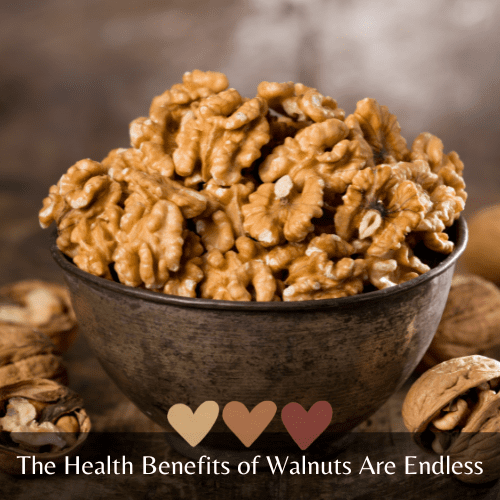Last updated 11 months ago | Originally Published: September 5, 2023
Discover the Health-Boosting Power of Walnuts
Did you know that humans have consumed walnuts for thousands of years, dating back to 7000 B.C.? It’s a surprising fact that makes you reconsider the significance of this often-overlooked nut. You might commonly find walnuts nestled in brownies or sprinkled over salads. However, many of us are unaware of their incredible health benefits.
Walnuts belong to the tree nut family, sharing the stage with almonds, cashews, and Brazil nuts. Yet, they stand out in their own unique way. From the outside, they even resemble a small, edible brain. Nature is dropping hints about their benefits for cognitive function.
However, the advantages of consuming walnuts extend far beyond improved brain health. They pack a nutritional punch containing healthy fats, protein, vitamins, and minerals. Therefore, including them in your diet can be beneficial in ways you may not have imagined.
The objective of this blog post is simple but profound: to explore the multifaceted health benefits of walnuts. From promoting cardiovascular health to their potential role in cancer prevention, walnuts offer many benefits backed by scientific evidence. This blog aims to be your comprehensive guide to understanding why walnuts should earn a spot in your daily diet.
Unpacking the Nutritional Goldmine in Walnuts
In this section, our focus turns toward the nuts and bolts of walnuts—literally. We aim to uncover the nutritional components that make this nut a small but mighty powerhouse in the health food category.
Nutrition isn’t just about calories; it’s about delivering the essential elements our bodies require for optimal function. Walnuts serve as a rich source of these elements, with their unique blend of fats, proteins, and more. By exploring their nutritional profile, we can understand the mechanics behind their numerous health benefits.

What Exactly Are Walnuts?
Walnuts are the edible seeds harvested from trees belonging to the Juglans genus. Recognized by their hard shell and unique, convoluted shape resembling a brain, they are a member of the tree nut family. Originating thousands of years ago, these nuts have been part of human diet and culture for generations.
Grown globally in temperate climates, they’ve found their way into various culinary dishes, from desserts to salads. Their distinctive taste pairs well with both sweet and savory flavors, making them a versatile ingredient in the kitchen.
Seven Nutrients That Make Walnuts a Health Powerhouse
Before diving into the details, it’s essential to note the well-rounded nutritional profile of walnuts. They are tasty and packed with elements that can significantly benefit our health.
- Fats: Walnuts are rich in polyunsaturated fats, which are essential for cardiovascular health.
- Protein: They contain quality protein, which is key in body repair and maintenance.
- Fiber: The fiber present in walnuts promotes good digestion and intestinal health.
- Vitamins & Minerals: These nuts are abundant in vitamins like B6 and minerals like magnesium, essential for various bodily functions.
- Antioxidants: Walnuts are a good source of antioxidants that fight cellular damage.
- Omega-3 Fatty Acids: They contain alpha-linolenic acid, a type of plant-based omega-3 fatty acid beneficial for heart health.
- Phytonutrients: These are plant-based compounds that have anti-inflammatory properties.
After this comprehensive list, it becomes evident why walnuts are a staple in many health-conscious diets. They offer more than just flavor; they serve as a nutritionally dense food that benefits various aspects of health.
Walnuts and Their Influence on Heart Health
In this segment, we’ll scrutinize how walnuts go beyond the status of a healthy snack to become a potent ally for your heart. Heart-healthy fats are more than just buzzwords; they’re crucial elements in cardiovascular care, and walnuts are an excellent source.
So, what makes these nuts a boon for your heart? We’ll explore that by looking into their specific nutritional components beneficial for cardiovascular health. In addition, we’ll consider scientific evidence that strengthens these claims. Regarding walnuts, science reinforces their reputation as a food beneficial for the heart.

The Nutritional Components Promoting Heart Health
Walnuts are a valuable source of fats, which benefits heart health. They contain alpha-linolenic acid, a plant-based omega-3 fatty acid. This type of fat is known for reducing inflammation, a significant risk factor for heart disease.
In addition, walnuts have polyphenols, which provide antioxidant benefits. These compounds help combat oxidative stress, thereby protecting your cardiovascular system.
Grounding the Claims in Scientific Research
It’s not just anecdotal evidence that puts walnuts in the spotlight for heart health. Multiple scientific studies give weight to this claim. One standout example is a research article published in the Journal of Nutrition, revealing that walnut consumption led to lower levels of bad cholesterol.
Another compelling piece from the American Journal of Clinical Nutrition states that walnuts improve endothelial function, enhancing cardiovascular well-being. Thus, the health benefits of walnuts are not just hearsay; they are solidly grounded in scientific research.
Walnuts as Catalysts for Cognitive Improvements
This section aims to unfold the lesser-known benefits of walnuts in the realm of cognitive health. While the idea of “brain food” might seem like a catchy marketing ploy, in the case of walnuts, there’s substantial merit to the claim.
Rich in certain types of fatty acids, antioxidants, and other neuroprotective compounds, walnuts have a promising role in enhancing brain function. We’ll explore the specific nutrients in walnuts that contribute to better mental acuity, memory, and overall cognitive function.
Furthermore, we’ll corroborate these points with credible scientific research, offering a comprehensive look at how this humble nut can be a significant player in maintaining and even improving brain health.

Nutrients in Walnuts that Boost Cognitive Performance
Walnuts are more than just a tasty snack; they’re packed with elements that can enhance your cognitive abilities. For example, they contain high omega-3 fatty acids, which are vital for cognitive function.
These fats aid in better memory and mental agility. In addition, walnuts are a rich source of antioxidants, which help combat oxidative stress that could otherwise impair brain function.
Scientific Studies Supporting Cognitive Benefits
The link between walnuts and brain health isn’t purely speculative; it’s supported by research. One study published in the Journal of Alzheimer’s Disease found that walnuts could improve learning skills and memory.
Another British Journal of Nutrition research paper highlighted that walnut consumption could enhance cognitive test performance. So when it comes to boosting brain function, walnuts aren’t just an old wives’ tale; they’re backed by solid scientific evidence.
Walnuts As a Natural Combatant Against Inflammation
Next, we’ll focus on another remarkable aspect of walnuts: their anti-inflammatory properties. Inflammation is a double-edged sword; while it’s a natural response to protect the body, chronic inflammation can lead to various health issues.
Walnuts stand out for their capability to mitigate this. Packed with a unique blend of nutrients and antioxidants, they offer several avenues for reducing inflammation. We’ll list six specific anti-inflammatory benefits of incorporating walnuts into your diet and substantiate these claims with rigorous scientific data.

Six Anti-Inflammatory Advantages of Walnuts
Before diving into the list, we must recognize the universal need for anti-inflammatory foods. From joint pain to heart disease, the potential applications are vast. Now, let’s look at the benefits:
1. Reduction of C-reactive Protein: Helps lower C-reactive protein levels, a marker of inflammation.
2. Omega-3 Fatty Acids: These fats are known to reduce inflammatory markers.
3. Antioxidant Action: Neutralizes free radicals that could lead to inflammation.
4. Improved Gut Health: A healthy gut can also mean less inflammation.
5. Lowering Blood Pressure: Reduced inflammation often leads to lower blood pressure.
6. Lessening Asthma Symptoms: Has the potential to alleviate inflammation in airways.
After perusing this list, the take-home message is clear: walnuts offer comprehensive tools to fight inflammation.
Backed by Science: How Walnuts Fight Inflammation
The anti-inflammatory perks of walnuts aren’t just talk; they are verified by empirical evidence. For example, a study in the Journal of the American Heart Association found that walnuts significantly lowered C-reactive protein levels.
Meanwhile, research from Nutrition, Metabolism, and Cardiovascular Diseases concluded that a diet rich in walnuts reduced markers of inflammation.
Additionally, a study published in the European Journal of Clinical Nutrition linked walnut consumption to improved gut health, which indirectly fights inflammation.
Therefore, it’s not a leap to suggest that walnuts can be a reliable, natural method for reducing inflammation.
Walnuts and Their Role in Weight Regulation
Shifting gears, let’s now turn our attention to how walnuts can be instrumental in weight management. The struggle to maintain a healthy weight is a challenge many face, often looking for reliable and effective methods to tip the scales in their favor.
Believe it or not, walnuts could be a game-changer in this arena. Contrary to the belief that nuts are calorie-dense and thus weight-gain inducers, walnuts have unique properties that can assist in weight regulation.
In this section, we’ll review how walnuts contribute to weight control and support these claims with academic research.

The Mechanisms of Walnuts in Weight Control
Walnuts, high in healthy fats and fiber, have a role in weight management that’s often overlooked.
Firstly, the fiber content helps you feel fuller for longer, reducing the urge to snack. Secondly, the fats in walnuts are predominantly unsaturated fats, which have a positive metabolic impact.
Also worth noting is the protein content, which can aid muscle development when coupled with regular exercise.
Consequently, incorporating walnuts into your diet can provide a satiating and nutrient-rich option that may discourage overeating and thus assist in weight control.
Academic Support for Walnuts in Weight Management
Skeptical? There’s robust research to back up these claims. One study conducted by the Journal of Nutrition showed that walnut consumption did not lead to weight gain, debunking the myth that nuts are unhealthy for weight watchers.
Plus, a review in the journal Nutrients stressed the role of nuts, especially walnuts, in increasing satiety and promoting a healthier body mass index (BMI).
Another study published on Diabetes, Obesity, and Metabolism found that walnuts, as part of a reduced-calorie diet, led to greater weight loss than a diet without them.
In summary, walnuts aren’t just beneficial for the heart or brain; they can also be essential in your weight management toolkit. Thank you for your time.

The Cancer-Fighting Power of Walnuts
As we navigate through the extensive health benefits of walnuts, it’s crucial to spotlight their potential role in cancer prevention.
Cancer remains a leading cause of death globally, making any preventive measures highly sought after. Walnuts contain specific compounds that have been suggested to possess anti-cancer properties.
In this section, we’ll elaborate on these compounds and how they make walnuts a formidable opponent in the battle against cancer. We’ll also bolster these points with scientific findings to provide a rounded understanding.
Compounds in Walnuts Taking on Cancer
Walnuts come loaded with several compounds that have shown promise in fighting cancer. To start, ellagitannins, a type of polyphenol, may reduce the risk of certain cancers.
Additionally, walnuts are a good source of gamma-tocopherol, a type of Vitamin E that has demonstrated anti-cancer potential. The omega-3 fatty acids in walnuts also serve as another line of defense, particularly against breast and prostate cancer.
Scientific Research Supporting Anti-Cancer Properties
The claims about walnuts and cancer prevention are not mere conjecture; scientific studies support them. Research published in the Journal of Nutritional Biochemistry showed that ellagitannins from walnuts significantly prevented colon cancer cells’ growth.
Another study in the Nutrition and Cancer journal highlighted the efficacy of omega-3 fatty acids in walnuts in reducing the risk of breast cancer. Similarly, the American Journal of Clinical Nutrition featured a study linking gamma-tocopherol to a lower risk of developing prostate cancer.
Thus, the potential of walnuts in cancer prevention is compelling and backed by scientific scrutiny. Thank you for reading this section; stay tuned for more intriguing insights.

Unveiling Lesser-Known Health Perks of Walnuts
Let’s switch gears and cast light on the diverse yet lesser-discussed health advantages of incorporating walnuts into your diet. While we’ve covered heart, brain, and weight-related benefits, walnuts offer a range of other wellness boosts.
Overall, they’re a nutritional powerhouse with wide-reaching positive impacts, from your skin to your bones. In this section, we’ll provide a detailed list of these secondary but equally significant health perks, each backed by science or traditional wisdom.
Miscellaneous Health Boons You Didn’t Know About
Before diving into the list, it’s key to note that walnuts are incredibly versatile. They offer an array of benefits that extend beyond the commonly known. Here are seven of these often-overlooked advantages:
1. Skin Health: The omega-3 fatty acids in walnuts contribute to skin’s elasticity and moisture.
2. Bone Health: Rich in minerals like calcium and magnesium, walnuts can support stronger bones.
3. Improved Sleep: Walnuts contain melatonin, improving sleep quality.
4. Digestive Aid: High in fiber, they assist in better digestion and regular bowel movements.
5. Anti-aging: Antioxidants in walnuts may slow down aging by combating free radicals.
6. Enhanced Immunity: They are a good source of antioxidants and vitamins that bolster your immune system.
7. Better Hair: Walnuts contain biotin, known to strengthen hair and reduce hair fall.
After examining this list, it’s evident that walnuts serve as an all-around contributor to better health. Their benefits are not limited to a handful of issues but span a broad spectrum of bodily functions.
Practical Strategies for Adding Walnuts to Your Daily Meals
Navigating to the practical side of things, we aim to give you uncomplicated yet effective methods to include walnuts in your diet. The versatility of walnuts makes it easy to integrate them into various foods. So, how can you make them a regular feature in your daily meals?
First up, breakfast is an ideal stage to introduce walnuts. Sprinkle a handful over your morning cereal or yogurt. It’s a simple action that injects your first meal of the day with a much-needed nutritional kick.
Moving on, consider your mid-day meals. Salads are an excellent canvas for a walnut intervention. Just toss a few into any green or fruit salad. The crunch will not only enhance texture but also level up the nutrition.
Now, let’s talk about smoothies. If you’re a fan, walnuts are a great addition. They contribute a rich, nutty flavor, making your blended fruits and veggies even more of a treat.
for dinner, stir-fried vegetables and pasta dishes can be easily upgraded with some walnuts. Sautee them lightly and include them in the mix. They’ll bring a delightful crunch and a new layer of flavor to your evening meal.
Finally, don’t forget about snacks. Walnuts can be eaten independently or mixed with other nuts and dried fruits. They serve as a quick, satisfying fix for afternoon hunger pangs.
So, there you have it. With these simple incorporations, you can ensure that walnuts find a place in your meals from dawn to dusk.

Precautions and Caveats When Consuming Walnuts
While walnuts bring a variety of health benefits, it’s crucial to exercise some caution. This section will cover important considerations like allergic reactions and potential medication conflicts. Safety is just as important as consumption, and being well-informed can help avoid any unnecessary complications.
Addressing the Risk of Allergic Reactions
First, it’s important to note that walnuts are a common allergen. Consuming them can lead to symptoms like itching, swelling, or even anaphylactic shock in severe cases. Always perform an allergy test if you’re trying walnuts for the first time.
Moreover, keep an eye out for signs of allergic reactions, especially when introducing them to children’s diets.
Interactions with Medications
Next, let’s tackle the issue of medication interactions. Walnuts are rich in omega-3 fatty acids, which can potentially interfere with blood-thinning medications.
If you’re on such medication, it’s advisable to consult your healthcare provider before incorporating walnuts into your diet. It’s better to be safe and get professional advice to ensure there are no adverse effects.

Final Thoughts on Elevating Your Health with Walnuts
In conclusion, walnuts are more than just a tasty snack; they are nutritional powerhouses. The benefits are compelling, from boosting heart health to enhancing brain function and even aiding in weight management. Despite these positives, being cautious about potential allergies and medication interactions is essential.
Now, it’s your turn to act. Don’t miss out on these incredible health benefits; start incorporating walnuts into your daily routine today. It’s a simple step that could lead to significant positive changes in your overall well-being. So go ahead, add that crunch to your meals, and reap the rewards.
Credible Sources Backing the Health Benefits of Walnuts
For those who like to dig deeper into the scientific evidence, here’s a list of trustworthy sources:
1. Nutrients Journal – Examining the link between walnut consumption and cognitive function.
- Source: Walnuts and Cognitive Function
2. American Heart Association Journal – Discusses the impact of walnuts on cholesterol levels.
3. National Institutes of Health – Study about the anti-inflammatory properties of walnuts.
4. Frontiers in Nutrition – Covers the topic of walnuts in weight management.
- Source: Walnuts and Weight Management
5. News Medical Life Sciences – Examines the anti-cancer properties of compounds found in walnuts.
- Source: Walnuts and Cancer Prevention
For those keen on learning more, these references provide a robust basis for understanding the complex health benefits of walnuts. Feel free to get inspired.






Recent Comments